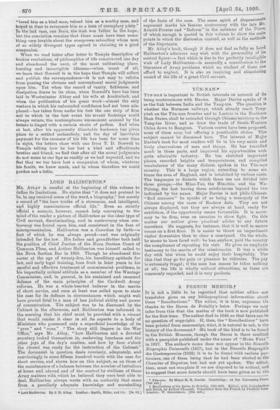LORD HA.LIBURTON.*
ATLAIr is careful at the beginning of this volume to define its limitations. He states that "it does not pretend to be, in any received sense of the word, a biography," but merely a record of "the bare truths of a strenuous, and intelligent, aad, highly conscientious official life." Even so strictly Official a memoir, however, cannot help conveying to the mind of the reader a picture of Haliburton as the ideal type of OM' servant, discriminating, cool in controversy when con- troversy was forced upon him, and consistent in the face of Misrepresentation. Haliburton was a Canadian by birth—a fact of which he was always proud—and was originally intended or the law. His father and grandfather both held the position of Chief Justice of the Nova Scotian Court of Common Pleas, and .Arthur Haliburton was himself called to the Nova Scotian Bar in 1865. Though he abandoned this career at the age of twenty-five, his hereditary aptitude for law, and early legal training, bore fruit in later years in his .careful and effective treatment of commissariat problems, in his impartially critical attitude as a member of the Wautage Commission, and, in general, in his sustained and reasoned defence of the main principles of the Cardwell Army reforms. He was a whole-hearted believer in the merits of short service, and once at least was called upon to state the case for its defence in circumstances which might well have proved fatal to a man of less judicial ability and power of concentration. The subject was to be discussed by the Cabinet in the afternoon, and Haliburton was informed in the morning that his chief must be provided with a resume that would render it dear in all , its aspects to a body of Ministers who possessed only a superficial knowledge of its " pros " and "cons." "The story still lingers in the War Office," says Mr. Atlay, "how Haliburton and a devoted secretary locked themselves in, eschewing luncheon and the _other joys of the day's routine, and how by four o'clock the resume was ready for the instruction of the Cabinet." The document in question deals concisely, adequately, and convincingly in some fifteen hundred words with the case for Short service, and shows how on this subject, as on those of the maintenance of a balance between the number of battalions at borne and abroad and of tho control by civilians of those Army matters with which be believed they were best able to deal, Haliburton always wrote with an authority that came from a peculiarly adequate knowledge and marshalling • LOttlfitsliburton. By J. B. Ant'''. London OnsIth, Rider, and Co. 1138. ca.] of the facts of the case. The same spirit of dispassionate argument marks his famous 'controversy with the late A:fr. Arnold-Forster and "Reform". in the columns of the Times, of which enough is quoted in this volume to show the main points in which the distension centred, as well as the methods of the disputants.
Mr. Atlay's book, though it does not deal as fully as Lora rialiburton'a admirers may wish with the personality of its central figure—a fact which is due to the perfectly intelligible Wish of Lady Haliburton—is assuredly a contribution to the literature of Army problems which no student of these can afford to neglect. It is also an inspiring and stimulating record of the life of a great Civil servant.






















































 Previous page
Previous page